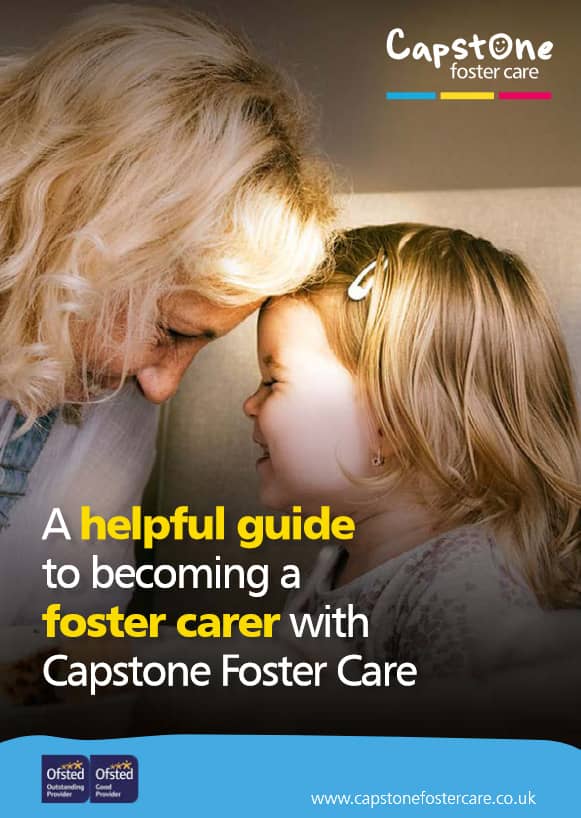


Fostering a disabled child
The role of an independent fostering agency
How to choose a foster care agency
Can I choose who I foster?
What are the benefits of fostering with an independent fostering agency?
What happens when a child is taken into care?
Fostering process: what happens on an initial home visit?
Fostering with local authority vs independent agency
A complete guide to becoming a foster carer
How Are Children in Foster Care Matched with Carers?
Foster Care Budgeting Tips
Becoming A Foster Carer
What is a Care Leaver?
What is a Foster Carer?
Fostering Regulations
How long does it take to become a Foster Carer?
What are the Foster Care requirements?
Changing IFA - Transferring to Capstone
8 reasons why a child may be taken into care
Fostering as a Career
Can you foster if you smoke or vape?
A guide to fostering assessments
LGBTQ+ Fostering
Equality, Inclusion & Anti-discriminatory Practice in Foster Care
What can disqualify you from foster care?
Can you foster if you’re on benefits?
Top transferable job skills to become a foster carer
Fostering as a same sex couple
Fostering while renting
Can you foster if you have mental health issues?
Is there an age limit for fostering in the UK?
Do foster carers get a pension?
How to foster a child: A step by step guide
How do DBS Checks Work?
Can I foster if...?
Mythbusting the top 10 Foster Care Myths
Can I foster if I am disabled?
LGBT Fostering Mythbusting
Can I foster if I have pets?
Can I Foster A Child?
Can I Foster and Work?
Can you Foster with a Criminal Record
Can Single People Foster?
LGBT Family and Foster Care
Fostering across Cultures
Muslim Fostering
Christian Foster Care
Sikh Fostering
Empty Nest Syndrome and Foster Care
Can I Foster?
What is the difference between residential care and foster care?
Fostering Babies and Young Children
What is Kinship Care?
Fostering Babies - Myths
Focusing on Parent & Child Fostering
Fostering Siblings
Fostering Teenagers
Fostering Teenagers - Breaking down the Myths
Fostering Unaccompanied and Asylum Seeking Children
Mother and Baby Foster Placements
Private Fostering
How does therapeutic fostering work?
Young Children Fostering Placements
Difference between short and long-term fostering
Types of self-harm
A Guide to the Foster Care Handbook
Reunification and Birth Parents: A Guide for Foster Carers
What is an EHC Plan? A Guide for Foster Carers
How to prepare a child for becoming a care leaver
Children who foster: impact of fostering on birth children
Fostering LGBTQ+ Youth
How to prepare your home for a foster child
How to help a lonely child: A Guide for Foster Carers
What are the National Minimum Standards for Fostering Services?
10 tips for foster children's education
How to prepare your foster child for secondary school
Tips for coping when foster placements end
Tips for foster parents during Coronavirus
What happens if foster parents get divorced?
5 ways to manage Mother's Day with foster children
Tips for managing foster children's bedtime routines
How to handle foster child bullying
Fostering allowances and the gender pay gap
What discounts can foster carers get?
How to adopt from Foster Care
5 ways to manage Father's Day for children in foster care
8 most common fostering challenges
FosterTalk Membership with Capstone Foster Care
Supporting foster children's contact with birth families
A guide to independent fostering
Keeping Children Safe Online: A Guide For Foster Carers
Movies About Foster Care
Play-based learning strategies for foster carers
A Guide to the Staying Put Program
Why Foster Parent Wellbeing Matters
How to deal with empty nest syndrome
How to recognise signs of depression in foster children
Can you take a foster child on holiday?
Tips and advice on fostering with a disability
10 tips on connecting with your Foster Child
Fostering vs Adoption - What's the difference?
How Fostering can change a future
How to adopt from Foster Care
How to encourage children to read in Foster Care
How to prepare a Foster Child's bedroom
Reading and Storytelling with Babies and Young Children
Supporting Children's Learning
The 20 most recommended books Foster Carers and young people should read
Things you can do when your children leave home
The impact of early childhood traumas on adolescence and adulthood
Anxious Disorders in Foster Children
What is sexual abuse and sexual violence
Foster Child behaviour management strategies
Foster Parent Advice: What to expect in your first year of fostering
Capstone's twelve tips at Christmas
10 celebrities who grew up in Foster Care
Could Millenials be the solution to the Foster Care crisis?
Do you work in Emergency Services?
Form F Assessor and Assessment Training
Foster Care Fortnight
Improving Children's Welfare - Celebrating Universal Children's Day
New Year - New Career - Become a Foster Carer
Young People Charities
As we all know, a good night's sleep is important. Not only can it increase attention span, improve mental and physical health, but it can also boost learning capabilities for your foster child’s day ahead. If your foster child is having difficulty sleeping, there could be a number of reasons for this – but one of the most likely ones is if they have not had a consistent sleep routine in the past.
A bedtime routine – that consistent itinerary of habits you complete with your child before they sleep – allows your foster child to know what to expect, making them to feel more secure in their new home.
Our guide helps you to build a bedtime routine that works for you and your foster child, as well as offering advice for when your foster child finds trouble sleeping.
When it comes to establishing a bedtime routine for your foster child, there are a few initial steps that you should take:
1. Create a safe space
It’s important that your foster child feels safe in their own space. Your child’s bedroom should be clean and tidy – a good tip is to make sure the room is dark, with thick curtains or blackout blinds and reduce outside noise with double glazed windows. Allow them to choose whether to keep their door open or closed – as this can give them a sense of flexibility and control over their own environment, which they’re likely to not have experienced before. Adding comforting items such as a favourite blanket or stuffed toy can make the space feel like their own, and increase relaxation.
2. Choose a bedtime
Plan a bedtime that will allow your foster child to get as much sleep as is required at their stage of development. As a general rule, babies need 12-16 hours of sleep, toddlers need 11-14 hours, pre-school children need 10-13 hours, school children need 9-12 hours sleep and teenagers need 8-10 hours sleep.
3. Use the Four B’s
4. Stick with it
Stick with the bedtime routine and set a morning wake-up routine, too! Getting your foster child in the habit of waking up at the same time each morning can ease them into falling asleep at night.
It’s important to consider what is happening in your child’s world to cause sleep problems. A new environment, underlying mental health challenges or reliving memories of their trauma can keep your child awake at night. This troubleshooting advice can help you be there for them when they can’t sleep.
Due to learned behaviour, your child might feel they need to be on constant alert, and this hypervigilance could be preventing sleep.
Try to stop your child from using screens 1 hour before bedtime, and instead encourage more soothing activities such as a warm bath, listening to calm music, talking about their day or reading a story together. Keeping the lights dim encourages your child's body to produce the sleep hormone, melatonin. Repeating the same relaxing habits in the same order every night can help promote good sleep.
Lots of children have a fear of the dark or monsters under their beds, but foster children might also have a fear of being alone, unsafe, or abandoned. Your child might not want to, or know how to, talk about what they are afraid of.
Reassure them that they are safe, and that you are there to care for them. Saying comforting words, such as “I am here if you need me” can help reaffirm to them that they are not alone. Some children might prefer a baby monitor in their room, so they know you are reachable if they have a nightmare. A nightlight can also help keep fears of the dark at bay.
Panic attacks can be scary, but it’s important to stay calm whilst your foster child is experiencing a panic attack.
Explain to your foster child that they are having a panic attack, and matter-of-factly explain the symptoms they are experiencing. Soothe your foster child, explaining it will pass soon. Teaching your foster child breathing exercises can help. Give them plenty of space after the panic-attack has subsided to calm down. Help them to shift their focus onto something more enjoyable like a pet, photograph, or toy. Above all, reassure them that they are not alone. If they are experiencing persistent panic attacks, it may be that they require professional help.
Is your child running rings around you just when they should be winding down? It can feel like your child is misbehaving, but there are simple solutions to reduce how hyper your child is at bedtime.
First, cut sugary, e-number and caffeine filled foods and drinks before bedtime. Non-ADHD causes of hyperactivity also include stress, medical conditions, lack of exercise and lack of sleep. Doing lots of fun exercise throughout the day like riding a bike or playing in the playground, eating healthy, and following the bedtime routine can reduce hyperactivity. If you’re concerned, you can also talk to your paediatrician about your child’s symptoms.
Give it time. It may take a while before your foster child settles into their bedtime routine and can sleep through the night. Try setting small goals, such as encouraging the child to stay in their bed all night even if they are not sleeping the whole time, and create a reward system for when this happens so they know what is expected of them.
If you feel you need more support with managing a bedtime routine, you can speak with your GP. And, of course, the team here at Capstone Foster Care are on hand 24 hours a day – we offer full support and extensive fostering training prior to your placement, so you’ll feel thoroughly prepared for the placement before it begins. Get in touch with any queries you have regarding what to buy for foster care placements.
If you’ve got any questions or would like to find out more about fostering with Capstone, fill out the form below.
An experienced fostering advisor from your local area will then be in touch.

Start the conversation today. Our team of friendly advisors are on hand to answer any foster care questions you may have. We can offer you honest and practical advice that can help you decide if becoming a foster carer is the right path for you.


